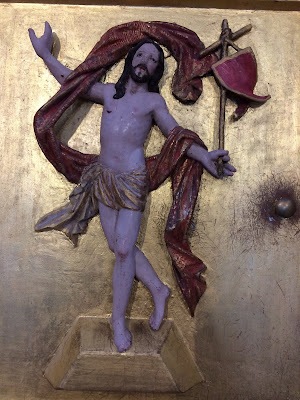IV SUNDAY OF EASTER - John 10:11-18
In our days, we go on preaching the same Good News the apostles preached: Salvation can be found only in Jesus Christ.
“For of all the names in the world given to men, this is the only one by which we can be saved.” (Act 4:12).
Jesus was rejected and sentenced to death on a cross, even though they could not find him guilty of any crime. However, God proved him right by raising him from the dead. He is like “the stone rejected by you the builders, but which has proved to be the keystone.” In him, we find the new humanity and upon him, the new people of God is set up. Jesus is the only Saviour through whom we can find meaning and purpose for our lives and the world. It is only through and in Jesus Christ that we can become God’s children. According to the second reading (1 Jn 3:1-2), God’s plan for humanity is to let us “be called God’s children; and that is what we are.” As God’s children, we will reflect on our faces the glory of God. Indeed, Christ “will transform our lowly body to be like his glorious body” (Phil 3:21). Then, “we shall be like him because we shall see him as he really is.” (1 Jn 3:2).
The work of salvation was carried out by Jesus Christ, who came so that we may have life “and have it abundantly” (Jn 10:10).
In this Sunday’s gospel, Jesus presents himself as the Good Shepherd. In the Old Testament, God is seen as the Shepherd who cares for his people. And in one of the most beautiful psalms, we address God as “my shepherd”: “he restores my soul. He leads me in right paths” and “I fear no evil; for you are with me” (Ps 23:1-4). Jesus is that shepherd, a good shepherd because he “lays down his life for his sheep”. He is not like the hired man, who cares only about his salary, working solely for earning a living. He does not pay attention to the needs of the sheep and will not put his life in danger to save any sheep. The hired man is moved by selfishness, while Jesus is moved by love and compassion. He is ready to lay down his life for his sheep.
In the Old Testament, the religious and political leaders were compared to shepherds and many of them behaved like the hired man, abandoning the sheep to themselves and causing them to get lost and to be devoured by the wild beasts of the forest. In Ezequiel, God condemns the evil shepherds and promises that one day he will become the shepherd of his people (Ez 34). Jesus is the fulfilment of that promise.
The people of God is in dear need of good shepherds in the manner of Jesus Christ. Let us pray for all the leaders of the world in all spheres of life that they learn with Christ to their lives at the service of others.


